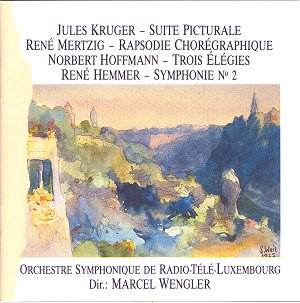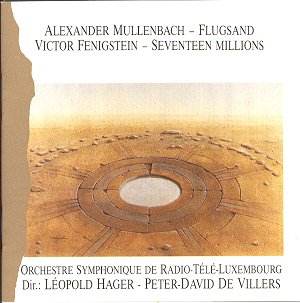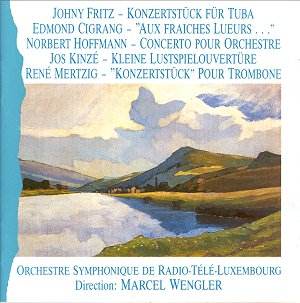Anthologie de Musique Luxembourgeoise: Volumes 1, 4 and 6
Volume 1
Jules Kruger Suite
Picturale
René Mertzig Rapsodie
Chorégraphique
Norbert Hoffmann Trois
Élégies
René Hemmer Symphonie No
2
Volume 4
Alexander Mullenbach
Flugstand
Victor Fenigstein Seventeen
Millions
Volume 6
Johny Fritz Konzertstück
für Tuba
Edmond Cigrand Aux Fraiches Lueurs
...
Norbert Hoffmann Concerto pour
Orchestre
Jos Kinzé Kleine
Lustspielouverture
René Mertzig Koncertstück pour
trombone
 Orchestre Symphonique de
radio-Télé-Luxembourg
Orchestre Symphonique de
radio-Télé-Luxembourg
cond Marcel Wengler, Léopold Hager, Peter-David de Villiers
Discs unnumbered
LGNM
Luxembourg Society for Contemporary Music
The idea of listening to over three hours of music from an area not noted
for having a 'school' of composers or perceived as nationalistic or particularly
defining in compositional terms, borders on the bizarre. One would anticipate
composers indigenous to Luxembourg to be of no fixed abode stylistically.
So it proves.

Volume one's first item, Jules Kruger's Suite Pictorale,
begins as 'light music', attractively so, but before the first movement's
five minutes are up, one is craving for more personality, more engaging themes,
and regretting the coarsely-orchestrated climax. Kruger (1899-1976) is claimed
as the 'first composer to have tackled the symphonic form in a serious way';
maybe, but this 18-minute suite isn't symphonic and doesn't really suggest
aspiration beyond the pictorial. The second movement's Roussel-like rhythms
and Debussyesque splashes of harp, and the third section's closeness to the
opening of Bartók's Music for strings, percussion and celesta,
do not really suggest the work of a composer with a distinctive voice.
Rapsodie Chorégraphique by René Mertzig (1911-1986)
has an oriental cast crossbreeding with a Viennese waltz - the latter is
distilled with Ravelian instincts - but the former doesn't compete with Ibert
(Escales), Nielsen (Aladdin) or Holst (Beni Mora). It
is, though, subtly and cleverly orchestrated suggesting a promise that isn't
always delivered - atmospheric in colouring, the anticipated 'big tune' doesn't
arrive but it's a pleasant piece, one varied, decorous and animated.
With Kruger and Mertzig, Norbert Hoffmann (born 1916) is regarded
as the third 'founding-father' of Luxembourg's symphonic music. His Trois
Elégies, for strings (arranged from the original brass band scoring),
reflect the threat and separation of the Second War - personal and affecting,
these elegies are sincere, neo-baroque studies of grief withdrawn to meditative
cantilenas, a healing process for the composer maybe.
It's not until volume one's final item that a symphonic work is reached -
René Hemmer's Second Symphony, which consists of three five-minute
movements. It's the cut of the material and how it's used that determines
between suite and symphony. Hemmer (born 1919) is abstract in his ideas and
pithy in their usage; this concentration of form works well enough, but the
invention is undistinguished, the structural compression compromised by
short-winded instrumental exchanges and 'explosive' orchestration that disrupts
the flow.

Things don't get any better with volume 4 and Flugsand fur Grosses
Orchester by Alexander Mullenbach (born 1949). At 25 minutes,
'flying sands' is too long; there are a few moments of colour, instrumental
interaction and harmonic atmosphere that engage. The booklet is silent on
the composition's date, but it's a 'fifties/'sixties piece in its pointillist
style, tone-row permutations, note-clusters and elements of 'chance'.
Victor Fenigstein (born 1924) completes volume 4 with a 36-minute
… I've no idea, let's call Seventeen Millions a parody. The text
- part sung, part declaimed by (soprano?) Céleste Barrett with further
comment from a narrator (Charles Muller) - is in German; there are no English
translations. The music is invented as required - a lot of percussion but
no real musical ideas co-exist with 18th/19th-century 'copies'; it's all
a bit Brecht and Weill, a bit of a cabaret - whatever its theatrical premise,
listening through just once proved immensely irritating.

Volume 6 has more from Hoffmann and Mertzig. The former's
Concerto for Orchestra has percussive tattoos, fanfaring trumpets;
it's all rather filmic, quite attractive in its open-spirit chorales, but
so heavy-weathered in getting anywhere, so four-square in expression. Ultimately,
like so much of the music here, one is either hearing influences or registering
anonymity; the neo-classical template proving useful to putting ideas down
and formally moving them around, but there is little that is original, inventive
or worth a second listen. I can't imagine trombonists queuing to play Mertzig's
Konzertstück or tuba-players booking Johny Fritz's
similarly-titled piece.
Of Edmond Cigrang's Aux Fraîches Lueurs (for soprano,
flute, cor anglais, horn and strings), having a pastoral atmosphere is one
thing, not having a melodic expanse on which to hang the words is quite another.
Finally Jos Kinze's Kleine Lustspielouverture is rather good
- by now, I needed a laugh! Only three minutes long, this is a spirited,
rather jolly piece with a charming middle section for contrast; it's not
great but it's such a relief to hear something that teases and makes the
shoulders swing.
The performances are decent enough, so are the recordings. It doesn't really
matter - there is nothing here I could recommend. These CDs, for the most
part, present neutral, grey-coloured functional music.
Colin Anderson
See also reviews of Volumes 2 and 5

